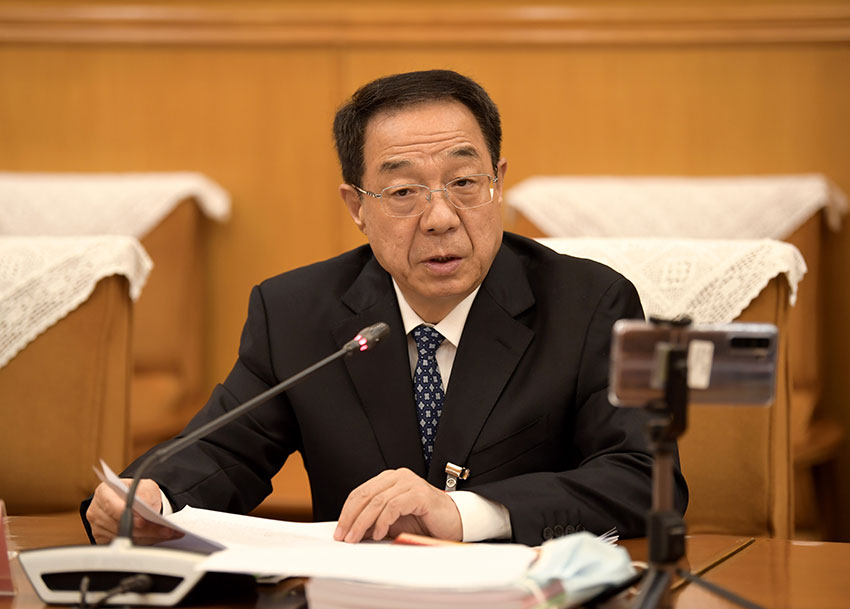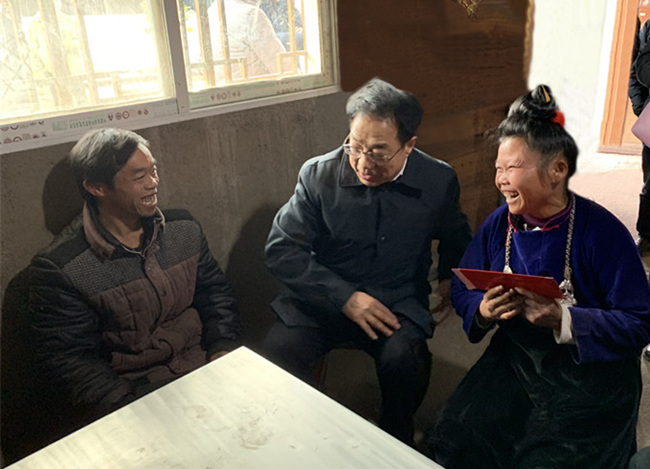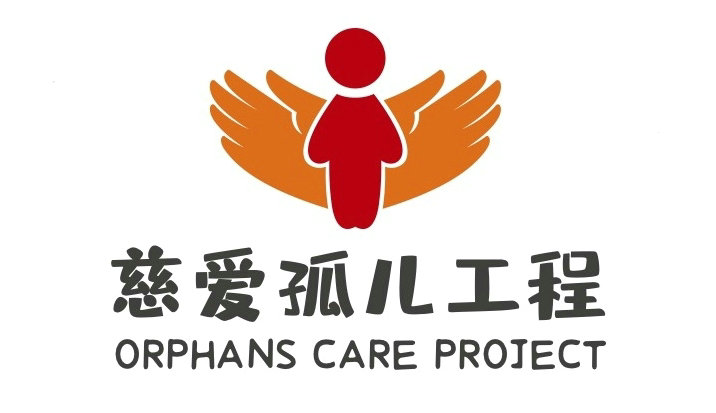→ 英文网站
Recommend Projects

WeChat Attention
President Gong Puguang received an exclusive interview from OUTLOOK WEEKLY
2023-03-24 08:55
来源:本站
◇Since the first session of the 13th National People's Congress, more than 100 deputies from five delegations have put forward a total of 7 bills amending the Charity Law and more than 50 proposals for improving the system and mechanism of charity, reflecting the great concern and ardent expectations of all sectors of society and deputies to the National People's Congress.
◇The draft amendment reforms the recognition mechanism, lowers the threshold for the number of years of public fundraising qualifications, adds a public fundraising qualification withdrawal mechanism, improves procedures for terminating liquidation and residual assets and improves the governance mechanism for charitable organizations. It clarifies the inclusion of charity in national economic and social development plans, completes and improves preferential support measures, establishes charitable credit records and incentive systems and stimulates the enthusiasm of the whole society for charity
◇The draft amendment further reinforces charitable tax incentives, expands the scope of preferential treatment, improves financial, land and other incentive policies, increases individual income tax and value-added tax preferential policies, clarifies that charitable trusts and charitable volunteer services enjoy tax incentives, enhances the attractiveness of the charity industry, taps the potential of charity, stimulates the vitality of charity and better plays the due role of the third distribution
Written by Reporter from OUTLOOK WEEKLY Zhang Chengcheng

A consultation meeting is held in Shanghai Gubei Civic Center to hear the opinions and suggestions of relevant parties on the Charity Law of the People's Republic of China (Amendment Draft) (taken by Liu Ying on February 7, 2023)
Helping one another and helping those in distress are virtues of Chinese nation.
Since the 18th National Congress of the Communist Party of China, under the strong leadership of the Central Committee of the Communist Party of China with Comrade Xi Jinping at its core, China has formulated and implemented the Charity Law, which has promoted the orderly development of charitable organizations and made great progress in charity, which has played an active role in winning the battle against poverty, building a moderately prosperous society in an all-round way, supporting people’s livelihood protection and social welfare undertakings and helping the prevention and control of the COVID-19.
Embarking on a new journey, charity has been given a better role in the third distribution, new requirements have been put forward for strengthening legal construction of charity to promote the functional positioning of common prosperity. On December 27, 2022, the draft amendment of the Charity Law was submitted to the 38th meeting of the Standing Committee of the 13th National People's Congress for deliberation for the first time.

Vice Chairman of the 13th NPC’s Social Construction Committee and President of China Charity Federation Gong Puguang
Recently, a reporter from the OUTLOOK WEEKLY conducted an exclusive interview with Gong Puguang, vice chairman of the 13th NPC’s Social Construction Committee and president of China Charity Federation, who has led the amendment of the Charity Law.
Gong Puguang says that charity is an important symbol of social civilization, a moral practice with a broad mass character, which can effectively promote the micro-balanced flow of social resources and wealth among different groups, improve the pattern of income and wealth distribution, is the main channel of China's third distribution, a useful supplement to primary distribution and redistribution and the only way to achieve common prosperity for all people and promote Chinese-style modernization.
Perfect the legal system of charity to promote common prosperity
OUTLOOK WEEKLY:as a fundamental and comprehensive law in the field of charity, the Charity Law is ushering in the first amendment in more than six years, what is the background and purpose of this amendment?
Gong Puguang: The Charity Law promulgated and implemented in 2016 is a milestone in China's legal construction of charity, providing a legal basis for traditional charity in our country to move toward modern charity and legal charity and playing an important role in promoting the legalization, standardization and specialization of charity in China.
More than six years after the Charity Law came into force, the procedures for amending the Charity Law were first of all to better abide by and serve the overall interests of the Communist Party and the country.
In the new era, the Communist Party and the country have further deepened their understanding of the important role of charity in overall economic and social development of the country, General Secretary Xi Jinping has made a series of important instructions which has pointed out the direction for the development of charity. It is emphasized in the report of the 19th National Congress of the Communist Party of China that improving the systems of social assistance, social welfare, charity, preferential care and placement where charity is clearly regarded as an important part of China's multi-level social security system.
It was proposed in the fourth Plenary Session of the 19th Central Committee of the Communist Party of China proposed for the first time that attaching importance to the role of the third distribution and developing charity and other social welfare undertakings, which has raised charity to the height of adhering to and improving the basic socialist economic system and promoting the modernization of the national governance system and governance capacity. It was appealed in the fifth Plenary Session of the 19th Central Committee of the Communist Party of China that "giving play to the role of the third distribution, developing charity and improving the pattern of income and wealth distribution", which took charity as an important way to promote common prosperity.
It was further proposed in the report of the 20th National Congress of the Communist Party of China that "guide and support enterprises, social organizations and individuals with aspiration and ability to actively participate in public welfare and charity", which regarded development of charity as an important measure to improve distribution system and made clear arrangements. These important spirits need to be fully displayed in the construction of the legal system for charity through the amendment to the Charity Law.
The second is the urgent need for the development of charity. Over the past six years, China's charity has been developing in a steady and healthy way, it has also faced some new situations and problems, including slow development of charitable organizations and disharmony between charity development and economic and social development; mismatch between low and slow increasement of total amount of charitable donations and wealth accumulation degree in China’s society; unbalanced and insufficient development of charity industry whose governance capacity and standard need to be improved; lack of preferential policies for charity trusts; coexistence of insufficient supervision and excessive supervision; the regulatory system and mechanism need to be strengthened and the supervision method needs to be optimized; principlization of support and promotion measures with unfulfilled and incomplete implementation; imperfect emergency charity system and insufficient role of charity in responding to emergencies and lack of effective legal norms on innovative forms of charity, such as online personal help and so on. All of above have put forward new tasks and requirements for strengthening the legal construction of charity.
The third is to respond to the expectations of society and the concerns of the people's representatives. With the vigorous development of charity in China, in recent years, the competent departments of charity administration, theoretical researchers and practitioners in the charity industry have called for the amendment to the Charity Law. Since the first session of the 13th National People's Congress, more than 100 deputies from five delegations have put forward a total of 7 bills amending the Charity Law and more than 50 proposals for improving the system and mechanism of charity, reflecting the great concern and ardent expectations of all sectors of society and deputies to the National People's Congress.
In particular in 2020, the Standing Committee of the National People's Congress organized and carried out an inspection of the enforcement of the Charity Law, gained an in-depth understanding of the new situations and problems encountered in the implementation of the law and listened to the urgent hopes from the front line of charity and the expectation of amending and improving the Charity Law. Opinions and suggestions on timely amendment to the Charity Law are clearly noted in the law enforcement inspection report, which is deliberated and approved by the Standing Committee of the National People's Congress.
The purpose of amendment to the Charity Law is to implement the decision-making and deployment of the Communist Party Central Committee on charity, respond to the concerns of People's Congress deputies and people, further optimize the institutional mechanisms in the field of charity so as to promote the solution of key and difficult problems in the development of charity and create a good legal environment for the high-quality development of charity and better shoulder the glorious mission of the third distribution to help common prosperity.
Intensify efforts to promote charity
OUTLOOK WEEKLY: What are the main changes in the draft amendment?
Gong Puguang: The original law consists of 112 articles in 12 chapters. This amendment adds 21 articles in one chapter and amends 47 articles, mainly involving five aspects.
The first is to reflect the new positioning of the role of charity. It further enhances the status and role of charity in the overall situation of China's modernization. It clarifies the Communist Party's leadership over charity work and includes "giving full play to the role of charity in the third distribution and promoting common prosperity" into the legal guiding ideology.
The second is to respond to new issues in the development of charity. A new special chapter will be set up to comprehensively regulate and promote charitable activities in major emergencies. It adapts to the development reality of "Internet + charity" and strengthens the supervision of online charity. In view of the rapid growth of online personal help activities and the related problems brought about, it adds relevant provisions to fill legal gaps.
The third is to optimize new measures for charity promotion. It reforms the recognition mechanism, lowers the threshold for the number of years of public fundraising qualifications, adds a public fundraising qualification withdrawal mechanism, improves procedures for terminating liquidation and residual assets and improves the governance mechanism for charitable organizations. It clarifies the inclusion of charity in national economic and social development plans, completes and improves preferential support measures, establishes charitable credit records and incentive systems and stimulates the enthusiasm of the whole society for charity.
The fourth is to improve the new mechanism for charity supervision. It is stipulated that people's governments at the county level or above are to establish coordination mechanisms for charity to strengthen the leadership and coordination and promotion mechanisms for charity. Clarify the scope of charitable assets and increase protection. It increases new procedures for the supervision of foreign-related charitable activities to safeguard national security interests. It clarifies the regulatory responsibilities of the government and relevant departments, adds regulatory means such as interviews, increases joint investigation work mechanisms, strengthens legal responsibility and intensify the positive incentive and rigid binding force of the law.
The fifth is to enrich the new system of charitable trusts. It clarifies the principle of charitable trusts enjoying tax incentives, strengthens the statutory requirements for beneficiaries and supervisors, increases the procedures for termination of charitable trusts and strengthens the internal governance of charitable trusts. It clarifies the property attributes of charitable trusts, refines and improves provisions on asset management, authorizes the formulation of annual expenditure and management fee standards and comprehensively regulates the operation of charitable trusts.
OUTLOOK WEEKLY: What are the highlights of the draft amendment?
Gong Puguang: there are four main highlights in the draft amendment.
First, it highlights the essential characteristics of charity with Chinese characteristics. The general provisions of the draft amendment not only include "giving full play to the role of charity in the third distribution and promoting common prosperity", the glorious and important historical mission entrusted by the communist party and the country into the legislative purpose, but also clearly define "charity should adhere to the leadership of the Communist Party of China" as the fundamental principle of charity. At the same time, it is clearly stated that "encourage the development of community charity, cultivate community charitable organizations" and "encourage the interactivity between community, social workers, community social organizations, community volunteers and community charity resources". The draft amendment clarifies in the supplementary provisions on the definition of online individuals' requests for help and the principles of relevant party activities and authorize the civil affairs department under the State Council to formulate relevant management rules, all of which fully display the essential characteristics of charity with Chinese characteristics.
The second is to improve the leadership system and coordination mechanism for charitable work. It increases provisions on the establishment of a coordination mechanism for charitable work and the strengthening of comprehensive supervision by people's governments at or above the county level, the enhancement of policy coordination and work synergy in the field of charity and the promotion of modernization of the charitable governance system and governance capacity.
The third is to further increase the promotion of the development of charity. Since charity in China is still in the initial stage of development, the potential and enthusiasm of social charity have not yet been effectively stimulated, it is urgent to strengthen guidance and policy support. Six new promotion measures in chapter 10 have been added in the draft amendment, throughout which the general tone has been enhanced.
For example, people's governments at or above the county level are explicitly required to include charity in their national economic and social development plans; Encourage the inclusion of charity in the core socialist values and national education; The country encourages the development of all kinds of charitable organizations and supports enterprises, individuals and other social forces that are willing and able to participate in charitable undertakings; Clarify the country's implementation of preferential tax policies for charitable undertakings and require the relevant departments of the State Council to formulate specific measures; Increase special provisions for the establishment of charitable trusts to enjoy tax incentives in accordance with the law; support and encourage the use of new technologies for charitable activities; Encourage international exchanges of charity. Although these promotion measures still have a gap compared with the needs of the development of charity, they have been greatly improved on the basis of the current law, which will certainly play a strong role in promoting the development of charity.
The fourth is to set up a special chapter system to standardize emergency charity activities. In recent years, charity has played an important role in emergency situations such as natural disaster relief and there are also some irregularities. In response to the society's great concern about the establishment of the legal system for emergency charity, a special chapter is added in the draft amendment to promote the more orderly, effective, open, transparent and standardized operation of emergency charity by strengthening the government's responsibility for coordination and guidance, making the strict requirements for efficiency and transparency in the allocation and use of funds and materials raised under emergency conditions and appropriately relaxing filing procedures.
Promote the micro-balanced flow of social resources and wealth
OUTLOOK WEEKLY: From the perspective of promoting Chinese-style modernization, what are the key points facing the development of China's charity in the next step?
Gong Puguang: The 20th National Congress of the Communist Party of China made comprehensive expositions and specific arrangements for promoting Chinese-style modernization and clearly pointed out that achieving common prosperity for all the people is the essential requirement and important feature of Chinese-style modernization. It can be said that charity with Chinese characteristics is a glorious mission and heavy responsibility. In order to promote the development of charity, we should focus on four aspects:
The first is to further appeal the whole society show concern to charity. Deeply implement the spirit of the 20th National Congress of the Communist Party of China, deepen the understanding of the important position and role of charity in the overall situation from the perspective of practicing the communist party’s purpose for the people, adhering to the basic economic system, people's livelihood security system and social governance system, incorporate the enhancement of the people's awareness of charity into the specific content of the core socialist values, vigorously promote the culture of charity, deepen the research on charity theory, popularize education on the concept of charity, increase the intensity of charity publicity and commendation, improve the spiritual encouragement of donors and practitioners and create social atmosphere where charity develops in a positive and progressive way and everyone inclines to participate in charity.
The second is to further improve charity legal system. Take the amendment to the Charity Law as an opportunity, brainstorm as much as possible to absorb rationalization suggestions from all walks of life, further improve the top-level design, improve the supporting system, strive to form a sound charity rule of law system, promote the regulation of charity and participation of charity according to law so as to lay a solid legal foundation for the high-quality development of charity.
The third is to further increase policy incentives. Tax incentives is an important lever to promote the development of charity, it is necessary to further expand the intensity of charitable tax incentives to expand the scope of preferential treatment, improve financial, land and other incentive policies, increase individual income tax and value-added tax preferential policies, clarify that charitable trusts and charitable volunteer services enjoy tax incentives, enhance the attractiveness of the charity industry, tap the potential of charity, stimulate the vitality of charity and better play the due role of the third distribution.
The fourth is to further optimize the governance pattern of the charity industry. The important purpose of this amendment to the Charity Law is to establish and improve the leadership system and coordination mechanism for charity work, implement the requirements of "decentralization, management and service", optimize the concept of supervision and put encouragement, support, coordination and promotion in the first place. In the future, we should fully respect the laws of charity industry and the autonomy of charitable organizations, reform the identification and approval systems, lower the entry threshold, broaden the channels for charitable participation, simplify procedures, reduce links and improve practical results. At the same time, it is necessary to strengthen management and standardized operation, enhance the level of industry self-discipline and autonomy and form a benign charity governance pattern with clear rights and responsibilities, reasonable distribution, distinctive characteristics, standardized management and efficient operation.












